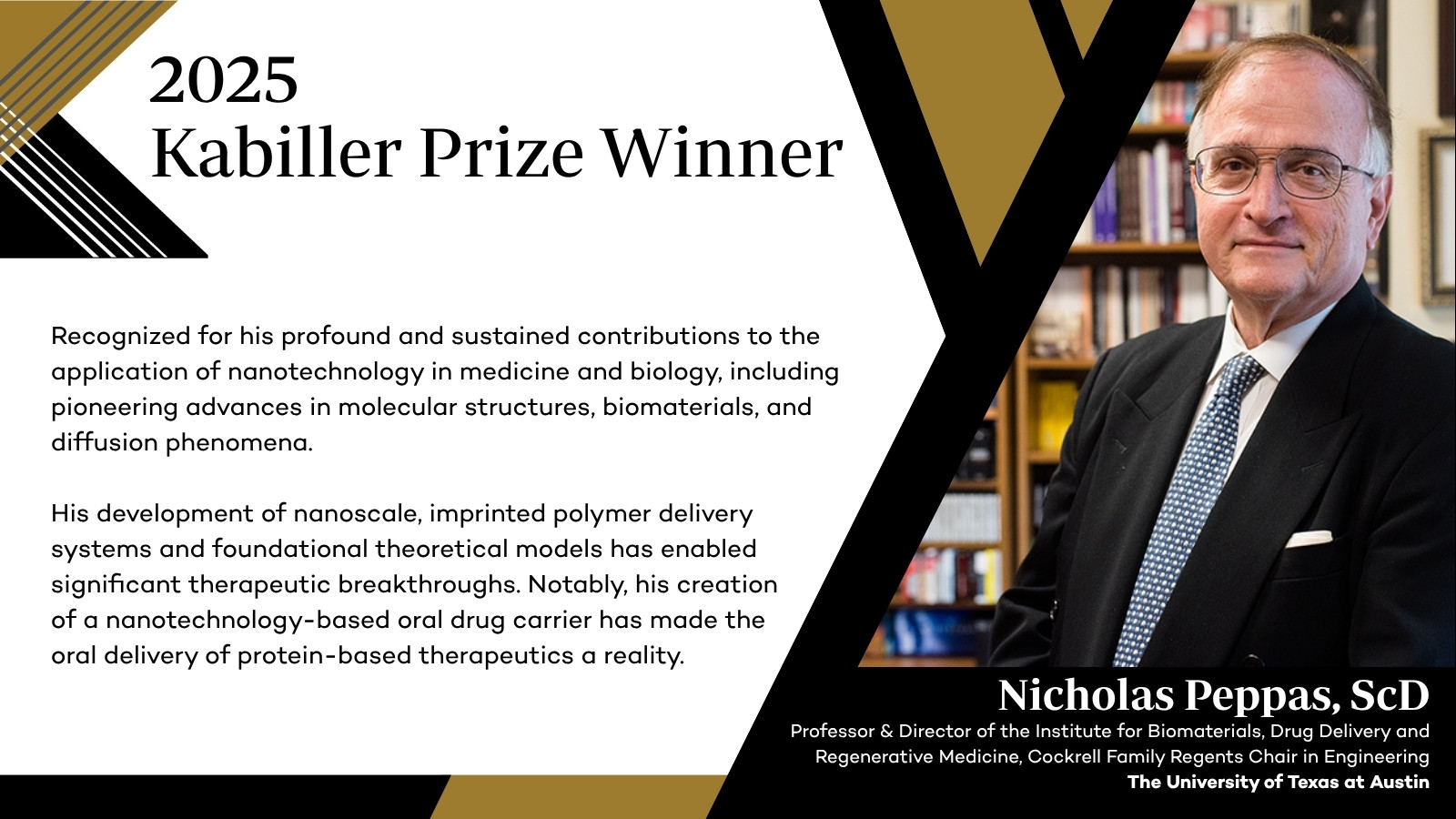Transforming Therapeutics with Nanotechnology
A true pioneer, Peppas has advanced the understanding of molecular structures, biomaterials, and diffusion phenomena, laying the foundation for transformative therapeutic innovations. His work has enabled targeted drug delivery and more effective treatments through the development of nanoscale imprinted polymer systems and foundational theoretical models.
Among his most influential achievements is the creation of a nanotechnology-based oral drug carriers—making it possible to deliver protein-based therapeutics, including insulin for diabetes and interferon for cancer, via oral administration. His innovations in biomolecularly responsive materials—such as devices that monitor glucose or release drugs in response to increased glucose concentration—have opened new frontiers in adaptive, personalized medicine.
Mentorship, Leadership, and Interdisciplinary Vision
Beyond his scientific achievements, Professor Peppas is a champion of interdisciplinary collaboration and a leader in translating laboratory discoveries into real-world medical solutions. He has also been a tireless advocate for education in biomedical nanotechnology, mentoring generations of researchers and innovators.
From Athens to Innovation: The Journey Begins
Nicholas A. Peppas was born and raised in Athens, Greece, in a family steeped in the humanities. His father, historian and economist Athanasios Peppas, and his maternal great-grandfather, the archaeologist Athanasios Rousopoulos, instilled in him a lifelong passion for literature, history, and the arts. Early in life, he pursued music and classical voice (baritone) at the Conservatory of Music in Athens. But his academic path took a decisive turn while studying at the National Technical University of Athens (NTUA). Inspired by the groundbreaking heart transplant performed by Christiaan Barnard in 1967, Peppas became captivated by the possibilities of medical technology and shifted his focus to chemical engineering.
In 1971, he moved to the United States to pursue his graduate studies at MIT, earning a Doctor of Science Sc.D. degree. There, he began investigating the interactions between polymers and biological systems—work that would form the bedrock of his future research in biomedical engineering. He continued this during his postdoctoral work on the fundamentals of arteriosclerosis again at MIT.
Academic Career and Research Legacy
Peppas launched his academic career at Purdue University in 1976. In 1987 he met his future wife and research collaborator, Dr. Lisa Brannon-Peppas. Their partnership, both personal and professional, has resulted in numerous significant contributions to medicine, pharmaceuticals, and engineering. Together, they have two children, Katherine and Alexander. Meanwhile. Peppas and several of ho doctoral students developed mathematical models and theories that led to a whole fundamental framework for design of micro- and nano-delivery systems at constant and variable rates. Some of these models known as the Peppas-Korsmeyer and the Brannon-Peppas models have become the standard design equations for many delivery systems.
In 2003, Peppas joined the University of Texas at Austin, where he currently serves as Professor and Director of the Institute for Biomaterials, Drug Delivery and Regenerative Medicine. He also holds the Cockrell Family Regents Chair in Engineering #6 and maintains appointments across multiple departments and schools, including Chemical Engineering, Biomedical Engineering, Pediatrics, Surgery and Perioperative Care, and Molecular Pharmaceutics.
Peppas’s innovations have reshaped the landscape of drug delivery. His lab’s development of oral drug carriers capable of protecting proteins through the digestive tract has allowed medications like insulin, calcitonin and interferon to be administered without injections. He has also led the creation of “smart” materials that release drugs in response to physiological signals—such as blood glucose levels or body temperature—offering dynamic solutions for diseases like diabetes and malaria.
As one of the most highly cited scientists in his field, Peppas’s work has contributed to more than 20 medical products with multibillion-dollar markets, improving health outcomes for millions around the globe.
Global Honors and Recognition
His achievements have been widely recognized with many of the most prestigious honors in science and engineering. In addition to the Kabiller Prize, Peppas has received the Founders Award (now Ramo Award) from the National Academy of Engineering, the Pierre Galletti Award from the American Institute for Medical and Biological Engineering, the Adam Jarmolinsky Medal from the National Academy of Medicine, the William Walker and Warren K. Lewis Awards from the American Institute of Chemical Engineers, the Pritzker Award from the Biomedical Engineering Society, the Acta Biomaterialia Gold Medal, and the Ellis Island Medal of Honor, among others.
He is a member of the National Academy of Medicine, the National Academy of Engineering, the American Academy of Arts and Sciences, and the Academy of Athens—Greece’s highest academic distinction. He is also a member of the Chinese Academy of Engineering, the Korean Academy of Science and Technology and Academies in Mexico, France, Spain, Canada and Romania. He also holds honorary degrees from the University of Ghent, Belgium, University of Parma in Italy, Universities of Santiago de Compostela and La Laguna, in Spain, the University of Ljubljana in Slovenia, Tel Aviv University in Israel, Rowan University, the National Technical University of Athens, and The Universities of Athens, Patras and Thessaloniki, all in Greece.
A Life Beyond Science: Music, History, and the Humanities
But Peppas is far more than a celebrated scientist—he is a true Renaissance figure. His passion for the humanities has led him to publish extensively in Byzantine and European history, especially on the Macedonian dynasty (976–1025), with thirty articles to his name. An avid operaphile and music scholar, he has written numerous essays and critiques on Italian, French, and German Romantic opera, published in major music journals. He is the author of several books on Greek opera and maintains an extensive collection of original 78-rpm records featuring Italian and Greek opera singers from the late 19th and early 20th centuries.
A member of Lirica di Parma and the Metropolitan Opera Guild, Peppas was included in Who’s Who in Music in 1993.
Through his unique fusion of scientific excellence and cultural scholarship, Nicholas A. Peppas continues to inspire across disciplines—proving that innovation thrives where intellect meets imagination.
